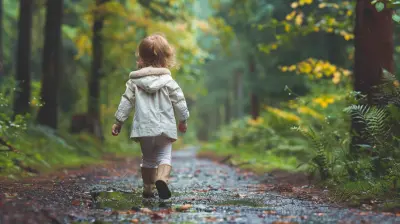The Importance of Outdoor Learning and Nature Exploration
4 June 2025
In a world where screens dominate our lives, it’s easy for kids to miss out on the wonders of nature. But have you ever noticed how a child's face lights up when they find a colorful bug or run freely in an open field? Outdoor learning and nature exploration are more than just fun; they are essential for a child’s development.
Let’s dive into why stepping outside is one of the best things we can do for our little learners.

Why Outdoor Learning Matters
Children learn best through hands-on experiences, and what better classroom than the great outdoors? Nature provides endless opportunities for exploration, creativity, and growth. Whether it’s listening to birds chirp, feeling the wind on their faces, or building a fort with sticks, every moment outside is a lesson.Here’s why outdoor learning should be a priority for every child:
1. Boosts Physical Health
Kids are naturally energetic, and outdoor play gives them the space to run, jump, climb, and stretch. Unlike screen time, which keeps them glued to one spot, nature encourages movement, improving strength, coordination, and overall fitness. Plus, soaking up the sun (in moderation) helps their bodies produce vitamin D, which is crucial for strong bones and a healthy immune system.2. Encourages Independence and Confidence
When kids explore nature, they make decisions on their own—whether it’s choosing which rock to climb, figuring out how to cross a stream, or deciding which trail to follow. These small choices help them build independence, confidence, and problem-solving skills. There’s no better way to learn resilience than by trying, failing, and trying again in a natural setting.3. Enhances Creativity and Imagination
Ever watched a child turn a stick into a sword or a pile of leaves into a fort? Nature is an open-ended playground where imagination runs wild. Without structured toys or rigid rules, kids create their own adventures, strengthening their creativity and critical thinking skills.4. Improves Mental Well-being
Spending time outdoors isn't just good for the body; it’s essential for the mind too. Studies show that outdoor play reduces stress, anxiety, and depression in children. The fresh air, sunshine, and endless opportunities for discovery boost happiness levels and help kids feel more relaxed and focused.5. Sparks a Love for Learning
Nature fuels curiosity. A child who watches a caterpillar crawl across a leaf might ask, “Where does it go next?” These small wonders spark a love for learning that lasts a lifetime. Outdoor experiences encourage children to ask questions, seek answers, and develop a deep appreciation for the world around them.
The Role of Nature Exploration in Child Development
Nature isn't just a passive backdrop for play—it actively shapes a child’s development. Here’s how engaging with nature can foster lifelong skills:1. Sensory Development
From the rough texture of tree bark to the cool splash of water, nature stimulates all five senses. This sensory engagement is crucial for brain development, helping kids fine-tune their ability to process the world around them.2. Social Skills and Teamwork
Outdoor play often involves group activities—whether it’s building a fort, playing tag, or exploring a trail together. These interactions teach kids cooperation, communication, and leadership skills. When they work together to solve a problem, they learn the value of teamwork.3. Risk Management
Climbing a tree, balancing on a rock, or navigating uneven terrain teaches kids to assess risks and make smart decisions. These experiences help them develop a sense of caution and confidence, which translates into better decision-making skills as they grow.4. Improved Concentration and Focus
Ever notice how kids who struggle to sit still indoors suddenly become more attentive outside? Nature has a calming effect that improves focus, concentration, and cognitive function. Studies have shown that outdoor learning helps children with ADHD and other attention-related challenges.
How to Incorporate Outdoor Learning into Daily Life
Now that we know why outdoor learning is so beneficial, let's talk about how parents can make it a regular part of their child’s life. You don’t need access to a huge backyard or a forest—nature is everywhere!1. Daily Outdoor Playtime
Make it a habit to spend at least 30-60 minutes outside every day. Whether it's playing in the park, going for a walk, or even exploring your garden, every little bit counts.2. Plan Nature Adventures
Take weekend trips to nearby nature spots—hiking trails, beaches, or botanical gardens. Explore different landscapes to give your child a variety of learning experiences.3. Create a Nature Journal
Encourage your child to document their outdoor discoveries. They can draw pictures, press leaves, or write about what they saw. This makes learning more interactive and helps them recognize patterns in nature.4. Participate in Gardening
Gardening is a fantastic way to introduce kids to nature. Let them plant flowers, herbs, or vegetables and watch them grow. Gardening teaches patience, responsibility, and the importance of caring for the environment.5. Go on Treasure Hunts
Create a nature scavenger hunt! Make a list of things for your child to find—like a red leaf, a smooth rock, or a bird’s nest. This turns outdoor time into an exciting adventure.6. Limit Screen Time
Encourage outdoor play by reducing screen time. When kids aren’t glued to tablets or TVs, they naturally seek out more active and creative forms of entertainment.7. Lead by Example
Kids mirror their parents’ behavior. If they see you enjoying nature—going for walks, hiking, or even just sitting outside with a book—they will develop a love for the outdoors too.
Overcoming Common Barriers to Outdoor Learning
While outdoor learning has countless benefits, many parents face challenges in making it a regular habit. Here’s how to overcome some common barriers:1. “We Live in a City”
Urban areas still have plenty of nature—parks, community gardens, and even tree-lined streets. Take advantage of green spaces available in your area.2. “The Weather is Bad”
Rain, snow, or cold shouldn’t always be a reason to stay inside. Dress appropriately and embrace the adventure! Jumping in puddles or building a snowman can be just as fun and educational.3. “My Child Prefers Screens”
Start by adding short outdoor sessions into their daily routine. Engaging, creative activities like bug hunts or outdoor crafts can make nature more appealing than screens.4. “I Don’t Have Time”
Incorporate outdoor learning into daily tasks. Walk to school instead of driving, have picnics outdoors, or do homework in the backyard. Small changes add up!Final Thoughts
Outdoor learning and nature exploration aren’t just hobbies; they are essential building blocks for a child’s physical, emotional, and cognitive development. In a world filled with distractions, nature offers a simple yet powerful way to help children grow into healthy, happy, and curious individuals.So, the next time your child asks to go outside—say yes. Step into the sunshine, breathe in the fresh air, and watch as nature becomes their best teacher.
all images in this post were generated using AI tools
Category:
Education TipsAuthor:

Max Shaffer
Discussion
rate this article
3 comments
Dean McKinney
Nature whispers secrets to curious minds; will your child listen and unlock its hidden wonders?
June 14, 2025 at 5:06 AM

Max Shaffer
Absolutely! Encouraging curiosity in nature is key to fostering a child's sense of wonder and discovery, unlocking invaluable learning experiences.
Emory Wolf
Nature: the original classroom with no homework!
June 11, 2025 at 4:36 AM

Max Shaffer
Absolutely! Nature offers hands-on experiences that spark curiosity and foster a love for learning without the pressure of traditional homework.
Hudson Reilly
Absolutely love this! Outdoor learning fosters creativity and resilience in kids. Embracing nature helps them thrive—let’s encourage our little ones to explore and discover the wonders around them! 🌿🌟
June 5, 2025 at 3:35 AM

Max Shaffer
Thank you! I completely agree—outdoor learning is vital for nurturing creativity and resilience in children. Let's keep inspiring exploration and connection with nature! 🌍✨



